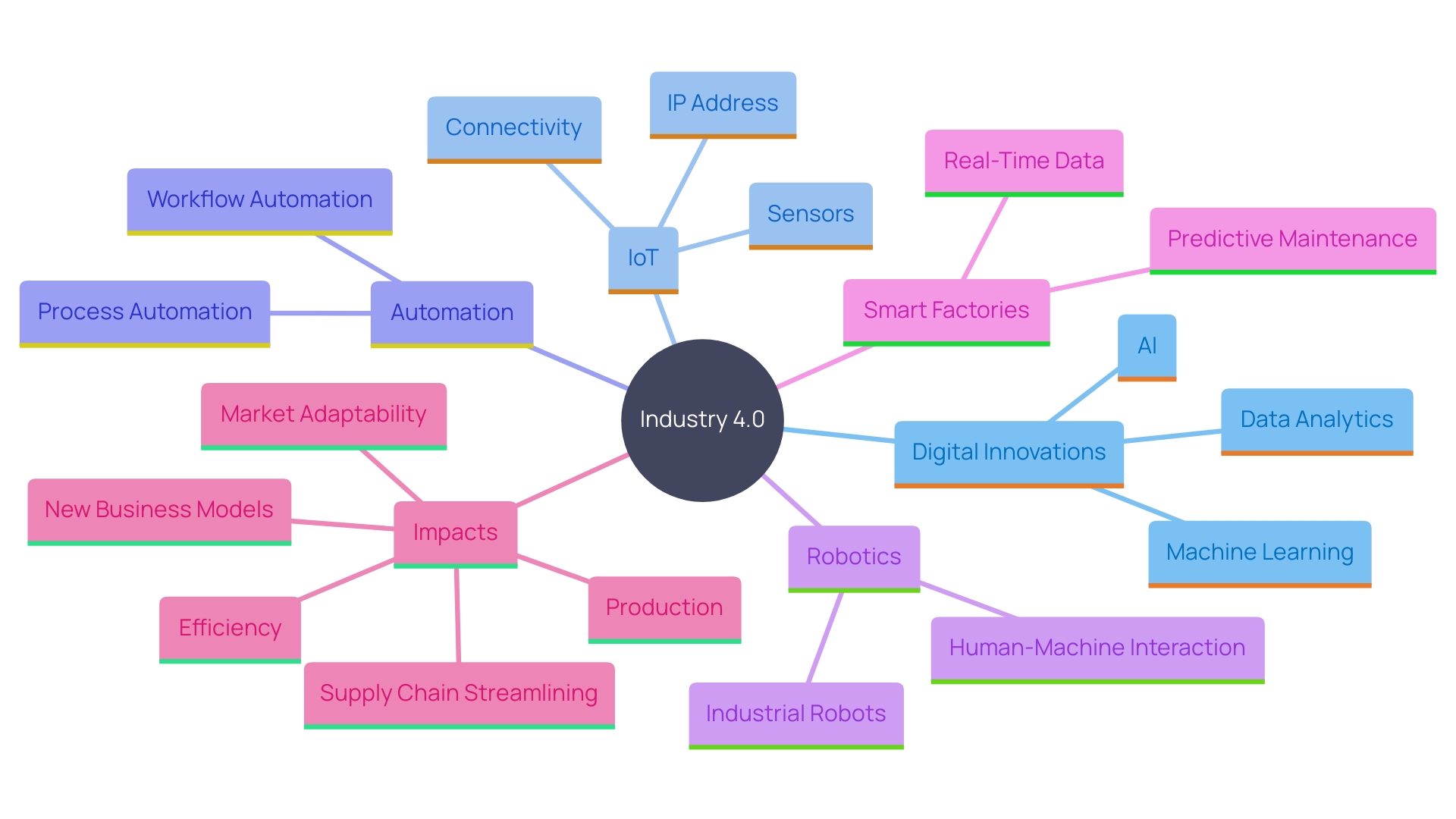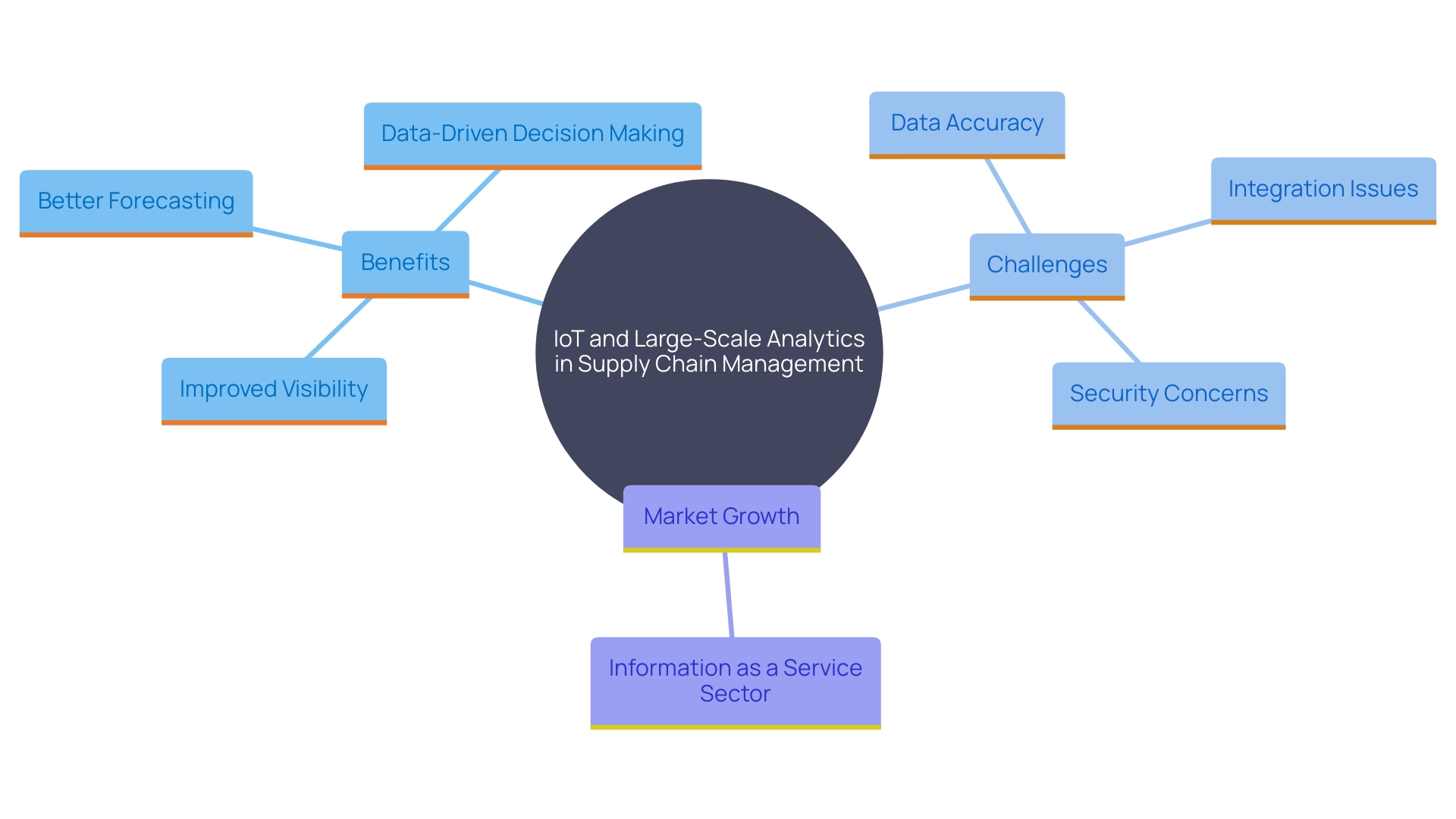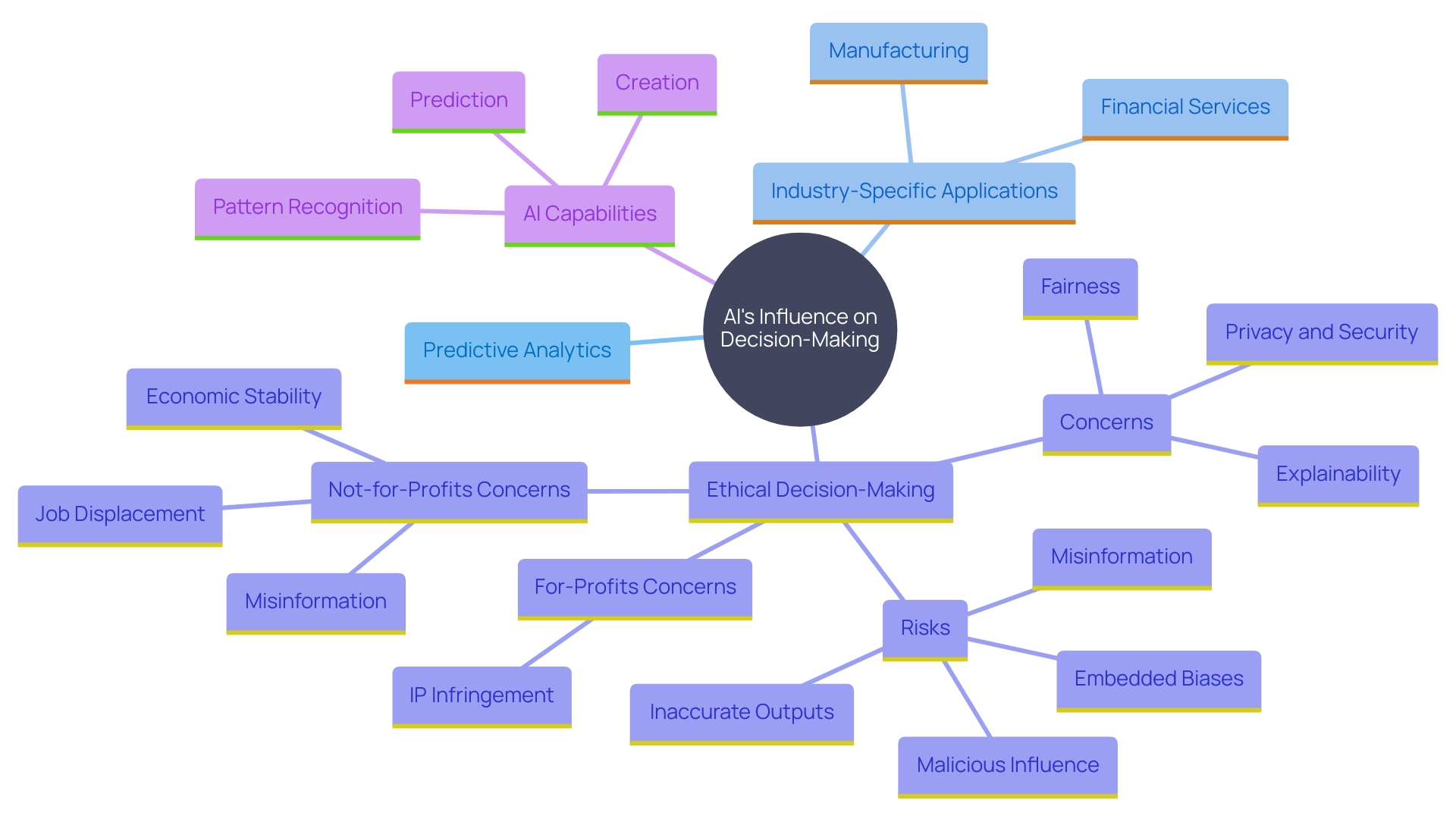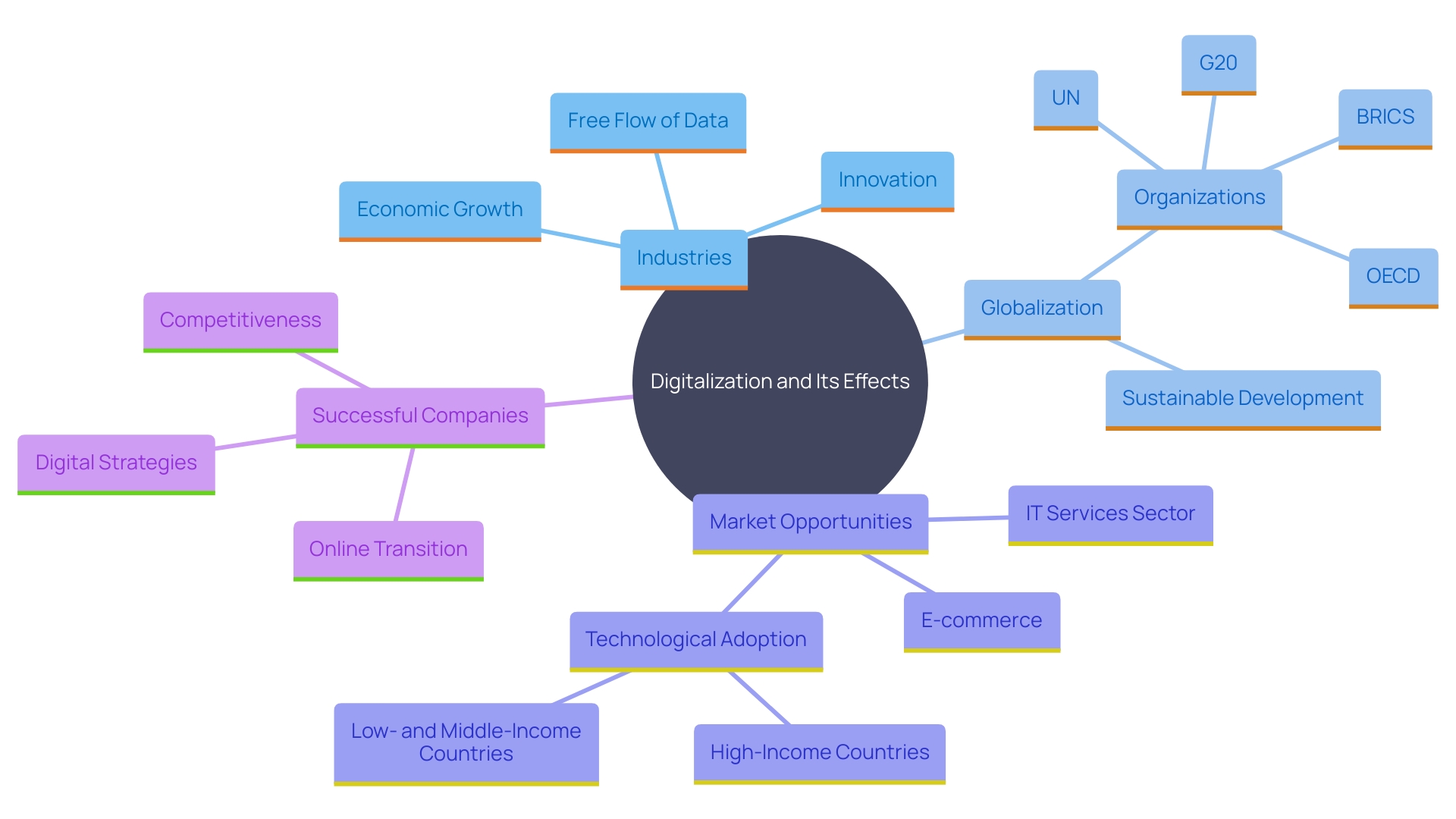Introduction
The manufacturing landscape is undergoing a seismic shift with the advent of Industry 4.0 technologies. This new era of production, characterized by the seamless integration of digital technologies, heralds unprecedented efficiency, customization, and quality control. Since 2016, the concept has gained momentum, leading to groundbreaking advancements in automation, robotics, and IoT by 2019.
These innovations have paved the way for smart factories, where interconnected devices optimize resource management and enhance productivity. As the industry continues to evolve, the focus on data-driven and intelligent solutions promises to redefine manufacturing, enabling businesses to meet increasing demands with improved performance and higher margins.
Advancements in Industry 4.0 Technologies
Industry 4.0 represents a transformative phase in manufacturing, fueled by the incorporation of digital innovations into production processes. This revolution, highlighted since 2016 by Klaus Schwab of the World Economic Forum, has brought forth unprecedented efficiency, customization, and quality control in manufacturing. Advanced machinery equipped with IoT-powered sensors now enhances productivity, opening new dimensions in business operations.
In 2019, significant advancements in automation, robotics, and the Internet of Things (IoT) marked a pivotal year. These advancements enabled real-time data exchange, optimizing resource management and reducing operational costs. For instance, smart factories emerged, leveraging interconnected devices that seamlessly communicate to improve production efficiency. Companies like St. James have already realized higher production speeds and better margins by measuring ROI in terms of labor per case.
The potential of Industry 4.0 innovations to transform manufacturing processes is immense. With the advent of smart factories, businesses are achieving higher production speeds and better margins. Prominent producers are embracing these innovations to remain ahead of rising demands and enhance performance. As manufacturing continues to evolve, the focus on data-driven and intelligent concepts for control and visualization will shape the future of the industry.

The Rise of Big Data Analytics and IoT in Supply Chain Management
‘Large-scale analytics and IoT are transforming supply chain management by offering improved visibility and greater understanding of operations.’. By 2019, businesses increasingly adopted these technologies to improve real-time tracking of inventory and shipments, which has become essential for effective supply chain management. This transition has enabled better forecasting, reduced delays, and a more responsive approach to market demands, fostering data-driven decision-making.
However, the implementation of IoT and large-scale analytics is not without its challenges. Organizations frequently encounter challenges in acquiring real-time information on asset locations and status, which is essential for making prompt and informed decisions. Data accuracy remains a significant hurdle, often leading to errors in inventory levels and causing stockouts or overstock situations. Moreover, integrating IoT devices with existing systems requires robust network infrastructure and reliable sensors, along with considerable upfront costs and ongoing maintenance.
Despite these obstacles, the results are transformative. The worldwide large information as a service market is anticipated to hit $474.9 billion by 2033, demonstrating the increasing dependence on information-driven solutions. “Companies are now utilizing IoT advancements to optimize various aspects of logistics, including real-time tracking and tracing, inventory management, warehouse operations, and predictive maintenance.”.
As noted by Ben Tucker from Digi, scalability remains a challenge, particularly as inventory sizes grow and span multiple locations worldwide. Additionally, security concerns, both data-related and physical, must be addressed to ensure the integrity and safety of supply chain operations.
In essence, while the journey to fully integrated IoT and big data analytics in supply chain management involves overcoming significant challenges, the potential for improved efficiency, responsiveness, and cost savings makes it a worthwhile endeavor.

Emergence of Artificial Intelligence in Organizational Decision Making
Artificial Intelligence (AI) has significantly influenced decision-making processes since 2019, providing organizations with advanced tools to analyze extensive datasets swiftly and accurately. Machine learning algorithms, a core component of AI, facilitate predictive analytics, enabling businesses to forecast market trends and customer preferences effectively. This data-driven approach allows decision-makers to derive actionable insights, resulting in more informed and timely choices. The integration of AI in various industries, from supply chain management to risk assessment, demonstrates its versatility and potential for cross-sector applications. In financial services, for instance, AI has revolutionized fraud detection and prevention, safeguarding assets and enhancing customer trust. Similarly, in manufacturing, AI-driven systems have optimized production processes and boosted employee productivity, showcasing its transformative impact on operational efficiency. As AI continues to evolve, its role in ethical decision-making and human-AI collaboration becomes increasingly pivotal, ensuring that technology aligns with human values and enhances overall business success.

Digitalization and Globalization Trends
In 2019, digitalization continued to redefine industries, enhancing globalization and unlocking new market opportunities. Companies increasingly adopted online tools to expand their reach and engage with global customers, a trend underscored by the flourishing of e-commerce platforms. This technological transformation enabled small and medium enterprises to enter international markets with unprecedented ease.
For example, the UN Trade and Development initiative emphasizes how online economies can promote sustainable and inclusive development. Major organizations like the OECD and the G20 are actively exploring ways to harness e-commerce and the online economy for global growth. The online sector is a significant engine for economic growth and job creation, with the IT services sector expanding twice as quickly as the overall economy and generating jobs at six times the rate of the global economy.
However, the benefits of digitalization are not uniformly distributed. ‘While firms in high-income nations continue to incorporate technological solutions to streamline processes, many small and medium enterprises in low- and middle-income countries still lack basic technological infrastructure.’. For instance, from 2020 to 2022, the percentage of micro firms investing in technological solutions doubled, but it tripled for large firms. ‘East Asia has been a frontrunner, with the share of firms investing in technological solutions quadrupling during the same period.’.
Real-world examples like the transformation projects undertaken by companies such as Nets, which shifted from traditional training methods to online platforms, illustrate the profound impact of technological change. These efforts not only meet global and local market needs but also ensure compliance with international regulations.
As online strategies become essential for competitiveness, organizations must embrace these changes to thrive in a rapidly evolving landscape. The digital economy, through strategic initiatives and collaboration, promises a future where progress is inclusive and sustainable, ensuring no nation or community is left behind.

Conclusion
Advancements in Industry 4.0 technologies are revolutionizing manufacturing by enhancing efficiency, customization, and quality control. The integration of IoT, automation, and robotics has led to the rise of smart factories, optimizing production processes and enabling organizations to meet increasing market demands through data-driven decision-making.
Simultaneously, big data analytics and IoT are transforming supply chain management, offering improved visibility and insights. While challenges like data accuracy and infrastructure requirements persist, the potential for enhanced efficiency makes these technologies essential for agile operations.
Artificial Intelligence has also become a vital tool for decision-making, allowing organizations to analyze large datasets for informed choices. Its applications across various sectors demonstrate its capacity to boost operational efficiency and align technology with human values.
Digitalization further reshapes industries, unlocking new market opportunities. While benefits may not be evenly distributed, strategic initiatives can promote inclusive growth. Embracing digital tools is crucial for organizations striving to remain competitive in a rapidly evolving landscape.
In summary, the integration of Industry 4.0 technologies, big data analytics, AI, and digitalization provides organizations with pathways to enhance operations and achieve sustainable growth. By addressing challenges and leveraging these advancements, businesses can effectively navigate the complexities of modern manufacturing and position themselves for future success.

